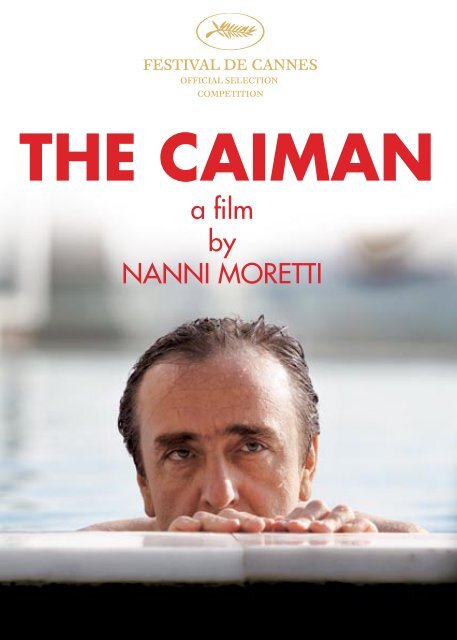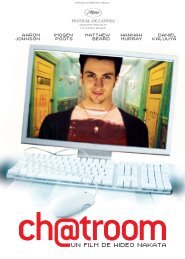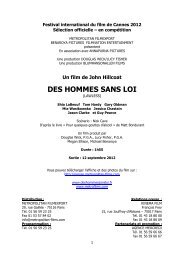in English - Cannes International Film Festival
in English - Cannes International Film Festival
in English - Cannes International Film Festival
Create successful ePaper yourself
Turn your PDF publications into a flip-book with our unique Google optimized e-Paper software.
THE CAIMAN<br />
a film<br />
by<br />
NANNI MORETTI
BAC FILMS and SACHER FILM present<br />
THE CAIMAN<br />
IL CAIMANO<br />
Produced by<br />
Angelo Barbagallo and Nanni Moretti<br />
a Sacher <strong>Film</strong>, Bac <strong>Film</strong>s, Stephan <strong>Film</strong>s, France 3 C<strong>in</strong>éma coproduction<br />
In collaboration with Wild Bunch, Canal +, C<strong>in</strong>éC<strong>in</strong>éma,<br />
<strong>in</strong> association with Sofica unietoile 3 and Sofica cofimage 17<br />
Runn<strong>in</strong>g time: 1h52<br />
French release : May 22nd, 2006<br />
French Distribution : Bac <strong>Film</strong>s - www.bacfilms.com/presse<br />
INTERNATIONAL SALES<br />
Paris Office :<br />
99 rue de la verrerie 75004 Paris France<br />
tel +33 1 53 01 50 30<br />
fax +33 1 53 01 50 49<br />
email avicente@exception-wb.com<br />
www.wildbunch.biz<br />
<strong>Cannes</strong> sales office :<br />
23 rue Macé , 4th floor<br />
Phone: +33 4 93 99 31 68<br />
Fax and ADSL: +33 4 93 99 64 77<br />
VINCENT MARAVAL, sales (cell +33 6 11 91 23 93)<br />
vmaraval@exception-wb.com<br />
GAEL NOUAILLE, sales (cell +33 6 21 23 04 72)<br />
gnouaille@exception-wb.com<br />
CAROLE BARATON, sales (cell +33 6 20 36 77 72)<br />
cbaraton@exception-wb.com<br />
SILVIA SIMONUTTI, sales (cell +33 6 20 74 95 08)<br />
ssimonutti@exception-wb.com<br />
a film by<br />
NANNI MORETTI<br />
Starr<strong>in</strong>g<br />
SILVIO ORLANDO<br />
MARGHERITA BUY<br />
JASMINE TRINCA<br />
NANNI MORETTI<br />
INTERNATIONAL PRESS<br />
PR CONTACT ASSESORIA EM ARTES LTDA.<br />
Resident Office :<br />
Rua Visconde de Pirajá,No 434, Casa 5,Ipanema,<br />
Rio de Janeiro, RJ CEP 22410-002 Brasil<br />
Tel: + 55 21 32 01 10 72 - Fax: + 55 21 22 87 31 08<br />
Email: philsymes@theprcontact.com<br />
ronaldo@theprcontact.com<br />
<strong>Cannes</strong> office :<br />
All Suites Garden Studio,<br />
All Suites Residence,<br />
12 rue Latour Maubourg 06400 <strong>Cannes</strong><br />
Direct (active from May 13 only):<br />
Phil SYMES + 33 (0) 06 09 23 86 37<br />
Ronaldo MOURAO + 33 (0) 06 09 28 89 55<br />
Virg<strong>in</strong>ia GARCIA + 33 (0) 06 18 55 93 62<br />
Crist<strong>in</strong>a SIBALDI + 33 (0) 06 23 25 78 31<br />
Email: festival@theprcontact.com
SYNOPSIS<br />
Bankrupt <strong>in</strong> his professional and personal life, Z-grade movie producer<br />
Bruno Bonomo – responsible <strong>in</strong> the past for such evocatively-titled offer<strong>in</strong>gs<br />
as MOCASSIN ASSASSINS and MACISTE VERSUS FREUD – is f<strong>in</strong>d<strong>in</strong>g it impossible to<br />
raise the f<strong>in</strong>ance for his latest project, THE RETURN OF CHRISTOPHER COLUMBUS.<br />
Entangled <strong>in</strong> debts and his own weaknesses, struggl<strong>in</strong>g with a capsiz<strong>in</strong>g<br />
marriage and his wayward kids, Bruno is go<strong>in</strong>g under.<br />
By chance, he meets a young director who gives him her script, THE CAIMAN.<br />
At first Bruno takes it for a half-hearted thriller; a more careful - if belated -<br />
read<strong>in</strong>g reveals a film about Berlusconi.<br />
No longer can he stand back. He must set up the production, f<strong>in</strong>d the lead<br />
actor, sort out the f<strong>in</strong>anc<strong>in</strong>g of the film – all the while try<strong>in</strong>g to pick up the<br />
pieces of his broken relationship.<br />
Yet <strong>in</strong> the midst of the endless setbacks and problems, a new spirit is<br />
awakened <strong>in</strong> Bruno Bonomo, and with it, the assertion of his dignity.<br />
This man, washed up as he seemed, f<strong>in</strong>ds with<strong>in</strong> himself the energy to<br />
pursue the project to its end – what came to Bruno as the result of pure<br />
chance has become <strong>in</strong> his eyes a matter of life and death.
INTERVIEW WITH NANNI MORETTI<br />
When did you beg<strong>in</strong> to feel the desire to return to c<strong>in</strong>ema,<br />
to prepare a new film?<br />
Before the Place Navone <strong>in</strong>cident, at the end of 2001, I was work<strong>in</strong>g on a<br />
documentary about Berlusconi. My direct political activity meant I had to<br />
put the documentary to one side. I took many steps forward with regards<br />
to this project. With two scriptwriters, <strong>in</strong> 2002 I wrote a more head-on<br />
treatment than THE CAIMAN about Berlusconi, but I wasn’t happy with it.<br />
Meanwhile, my political engagement cont<strong>in</strong>ued. I also began preparations<br />
for Valia Santella’s film, I CAN SEE IT IN YOUR EYES. A little later, first<br />
with Heidrun Schleef, then with Federica Pontremoli and Francesco<br />
Piccolo, I found a more oblique way of talk<strong>in</strong>g about Berlusconi and his<br />
‘adventure’.<br />
Were you look<strong>in</strong>g for a balance between Bruno<br />
Bonomo’s‘private’ life (his divorce, his relationship with<br />
his children) and his public life? What’s the l<strong>in</strong>k between<br />
them?<br />
THE CAIMAN is a film about love, an homage to c<strong>in</strong>ema, and a political<br />
film. The character of Bruno (and Silvio Orlando’s performance) unifies<br />
these different aspects. At the beg<strong>in</strong>n<strong>in</strong>g, Bruno f<strong>in</strong>ds himself <strong>in</strong>volved<br />
almost by chance <strong>in</strong> this young first-time director’s film, then slowly, beg<strong>in</strong>s<br />
to grow passionate about the project. But I didn’t want to turn Bruno <strong>in</strong>to a<br />
character who ‘wakes up’; I didn’t want to give him an ideological journey.<br />
Maybe he’s <strong>in</strong>trigued by this young woman and her stubbornness. Maybe<br />
he wants to show his wife, from whom he is splitt<strong>in</strong>g up, that he too is<br />
capable of produc<strong>in</strong>g an important film. Maybe it’s also the number of<br />
rejections he’s had to endure: he ends up conv<strong>in</strong>c<strong>in</strong>g himself that the film<br />
should be made, that it’s necessary. But above all he is eager to get back to<br />
work, to get back on a set, to hear the cry : Lights ! Camera ! Action !<br />
What does Bruno’s character symbolize? An average Italian,<br />
a Forza Italia voter? A man of the past?<br />
Like many Italians, Bruno voted <strong>in</strong> the past for Berlusconi, but he’s not a<br />
politicized person. He’s a producer <strong>in</strong> love with his work. A craftsman<br />
who enjoys a real love affair with c<strong>in</strong>ema, an almost physical relationship:
he lives and sleeps <strong>in</strong> his offices from which he can see his old studios,<br />
now unused. I wanted to construct this character: his relationship with his<br />
children, his wife, with whoever, with his work, but I didn’t trouble myself<br />
with whether or not Bruno is representative of a certa<strong>in</strong> type of Italian..<br />
What should we make of the films he’s produced? You seem<br />
to have taken real pleasure <strong>in</strong> film<strong>in</strong>g <strong>in</strong> a certa<strong>in</strong> populist<br />
c<strong>in</strong>ema style, mak<strong>in</strong>g Margherita Buy a sort of Tarant<strong>in</strong>o<br />
hero<strong>in</strong>e. Was that the case?<br />
Naturally I had a lot of fun shoot<strong>in</strong>g CATARACTS and imag<strong>in</strong><strong>in</strong>g the filmography<br />
of producer Bruno Bonomo : MACISTE VS FREUD, MOCASSIN ASSASSINS, LADY<br />
COP IN STILETTOS. My affection isn’t so much for the films Bruno produces,<br />
as for the relationship he has with his films, with his work, with c<strong>in</strong>ema.<br />
A type of c<strong>in</strong>ema that is no longer made. But, unlike other genre or<br />
Z-grade producers, Bruno is not a frustrated person, he feels no rancour<br />
towards auteur or politically engaged or big budget c<strong>in</strong>ema. He doesn’t<br />
suffer from either an <strong>in</strong>feriority or a superiority complex.<br />
Why did you make Teresa a ‘lesbian mother’? To confront<br />
Bruno with a more modern lifestyle ? Or to put forward an<br />
Italy without men, without machismo?<br />
It gave me great pleasure to put another sort of family on screen. Without<br />
deliver<strong>in</strong>g ideological speeches, without rhetoric, but rather, very simply.<br />
Initially, Bruno reacts with a sort of comic hysteria, but that doesn’t prevent<br />
him, from the next scene on, start<strong>in</strong>g back to work on the preparation for<br />
Teresa’s film.<br />
Berlusconi appears <strong>in</strong> four different <strong>in</strong>carnarions. The first one<br />
is played by Elio De Capitani, who bears a strong physical<br />
resemblance... He embodies Berlusconi <strong>in</strong> Bruno’s imag<strong>in</strong>ation<br />
when read<strong>in</strong>g the script to Teresa.<br />
I play on the fact that Bruno reads the scenes that excite him: the viewer<br />
understands that he’s read<strong>in</strong>g a script about Berlusconi, while Bruno, on<br />
the other hand, hasn’t understood because he’s carried away by the action<br />
scenes. Maybe as he reads, he’s th<strong>in</strong>k<strong>in</strong>g: ”It’s a great scene, but it will be too<br />
expensive”. He’s not concentrat<strong>in</strong>g fully, because of his problems with his wife;
he’s distracted. And he’s desperate, hav<strong>in</strong>g been dropped earlier by another<br />
director. Dur<strong>in</strong>g the writ<strong>in</strong>g, we wanted to joke about the producer’s lack of<br />
understand<strong>in</strong>g. In one of the first versions of the outl<strong>in</strong>e, well before the script,<br />
when I was work<strong>in</strong>g with Heidrun Schleef, we even had Americans read<strong>in</strong>g<br />
the script and mistak<strong>in</strong>g it for a gangster movie!<br />
Second appearance of Berlusconi is the man himself, seen<br />
<strong>in</strong> extracts from archive TV footage.<br />
In the script, Bruno and Teresa watched a foreign documentary while<br />
prepar<strong>in</strong>g the young director’s fictional film. At one po<strong>in</strong>t Bruno (Silvio<br />
Orlando) says: “But that’s a documentary and we have to make a film “. However,<br />
I don’t expla<strong>in</strong> it, it’s not necessary. In the script, it was a documentary<br />
because I wanted to show an outsiders’ take on us: the Polish producer,<br />
for example, talks about "Italian Operetta". They had to watch a foreign<br />
documentary - American or French - dur<strong>in</strong>g the preparation for Teresa’s<br />
film, as <strong>in</strong> real life, while writ<strong>in</strong>g the script, we watched an American<br />
and a French film about Berlusconi. An outsiders’ po<strong>in</strong>t of view is very<br />
important because we’ve come to accept th<strong>in</strong>gs that should be unth<strong>in</strong>kable<br />
<strong>in</strong> a democracy, start<strong>in</strong>g with the fact that the Prime M<strong>in</strong>ister owns three<br />
TV stations and can present himself and his message through <strong>in</strong>credible<br />
television characters.<br />
The prepp<strong>in</strong>g of Teresa’s film follows. Bruno beg<strong>in</strong>s the search<br />
for his lead actor. And so Berlusconi is played here by Michele<br />
Placido.<br />
For me, Michele Placido has a great presence and has also become a very<br />
f<strong>in</strong>e actor. I loved the idea of a well-known actor mak<strong>in</strong>g fun of the character<br />
of a well-known actor - Marco Pulici <strong>in</strong> the film. I have to say that I was very<br />
surprised by his receptiveness. Sometimes I can be a little annoy<strong>in</strong>g, <strong>in</strong>sist<strong>in</strong>g<br />
on numerous takes and so forth, so at the beg<strong>in</strong>n<strong>in</strong>g I was uneasy, I was<br />
afraid that Placido would get sick of it. On the contrary, he was tremendously<br />
receptive on set, which astonished me.<br />
F<strong>in</strong>ally we reach Berlusconi’s fourth appearance. And it’s a real<br />
surprise that we must not unveil. How did you get the idea?
What I liked most of all was the effect of surprise; then I wanted that there<br />
should be no physical resemblance and no attempt <strong>in</strong> the performance to<br />
resemble him physically either. I also liked the fact that I was trick<strong>in</strong>g the<br />
spectator: I refuse Teresa’s film at first by say<strong>in</strong>g th<strong>in</strong>gs I believe, by rightly<br />
mak<strong>in</strong>g fun of the Left. The idea was to wrong-foot expectations and to play<br />
the role without caricatur<strong>in</strong>g Berlusconi, while try<strong>in</strong>g to recreate for the<br />
viewer someth<strong>in</strong>g of what happened dur<strong>in</strong>g those years, the seriousness of<br />
which we have perhaps not fully appreciated. I am talk<strong>in</strong>g about the extent<br />
of the damage: ethical damage, constitutional damage, psychological,<br />
moral, cultural and economic damage, even if <strong>in</strong> this last area I am not<br />
<strong>in</strong> a position to evaluate the part for which Italy was responsible and the<br />
extent to which an <strong>in</strong>ternational crisis is responsible..<br />
Anyway, Berlusconi had already won thanks to television. Someth<strong>in</strong>g<br />
happened dur<strong>in</strong>g those years, someth<strong>in</strong>g happened to people’s spirit,<br />
and the hoped-for Centre-Left victory won’t put th<strong>in</strong>gs back as they were:<br />
it will take decades and decades. The pact upon which this democracy<br />
was founded, the Italian Constitution, a non-rhetorical anti-fascism – for<br />
<strong>in</strong> Italy fascism has def<strong>in</strong>itely existed –, this pact has been smashed <strong>in</strong>to<br />
a thousand pieces over the last 12 years. I’m not only talk<strong>in</strong>g about antifascism,<br />
I’m talk<strong>in</strong>g about values that should be shared by everyone. In a<br />
democracy, you can be divided on political questions, but certa<strong>in</strong> values<br />
should be held <strong>in</strong> common by progressive and conservative th<strong>in</strong>kers alike.<br />
For 12 years, that has no longer been the case <strong>in</strong> Italy. Before, a Christian<br />
Democrat and a communist could manage to communicate, to talk to each<br />
other. For 12 years that has no longer been possible: centre-Right voters<br />
can no longer communicate with their counterparts on the centre-Left, and<br />
<strong>in</strong>deed, no longer want to. Fascists and communists are placed on the<br />
same level: this stage was never before reached <strong>in</strong> Italy, not even when the<br />
communist party was very strong. At that time the Italian communist party<br />
was respected and feared. Today, <strong>in</strong> the absence of an effectual communist<br />
party - due to the transformation of the old PCI -, the word ‘communist’ has<br />
become an <strong>in</strong>sult. And, over the past 12 years, the fascist representatives<br />
have quietly gone <strong>in</strong>to government, even if, for reasons of opportunism or<br />
calculation, they have abandoned their previous political convictions. Be
that as it may, it hasn’t created any scandal <strong>in</strong> Italy: the pact on which this<br />
republic was founded has been rewritten <strong>in</strong> TV talk shows. That’s where we<br />
f<strong>in</strong>d the true Italian Constitution today, <strong>in</strong> the abom<strong>in</strong>ation of talk shows.<br />
At the end of the film, we have a political-fiction sequence,<br />
where Berlusconi is condemned by the tribunal and responds<br />
with an appeal to <strong>in</strong>surrection, almost a cry for civil war...<br />
It’s a charge Berlusconi lays aga<strong>in</strong>st the magistracy. In its clos<strong>in</strong>g m<strong>in</strong>utes,<br />
my film and Teresa’s are superimposed until they become confused. At<br />
the beg<strong>in</strong>n<strong>in</strong>g, as a person and as an actor who is play<strong>in</strong>g his role, I<br />
make fun of Teresa’s script without know<strong>in</strong>g it. Before that, as director, I put<br />
Teresa’s script on screen through the imag<strong>in</strong>ation of the producer, but it’s<br />
his imag<strong>in</strong>ation, his ideas. Then at the end, <strong>in</strong> the f<strong>in</strong>al m<strong>in</strong>utes of the film,<br />
me as director, Teresa as director, me as actor, we are a s<strong>in</strong>gle person.<br />
I loved that superimposition, which makes everyth<strong>in</strong>g co<strong>in</strong>cide.<br />
Do you see this charge aga<strong>in</strong>st justice as a possible recourse<br />
for Berlusconi should he lose the elections?<br />
It’s a metaphor. Above all, you have to remember that when Berlusconi<br />
expresses himself, when he addresses people, he does it above all through<br />
his television channels. And this endows him with a power and an arrogance<br />
<strong>in</strong> the eyes of the spectators: television is a familiarly arrogant <strong>in</strong>strument,<br />
or an arrogantly familiar one. Thus, via television, you can pass off th<strong>in</strong>gs<br />
not so easily passed off through other media.<br />
It’s also a metaphor for the damage he has <strong>in</strong>flicted on us: so that we<br />
th<strong>in</strong>k of the irresponsibility of this man, his lack of any sense of the State<br />
or its <strong>in</strong>stitutions, his permanent relationship of aggression towards the<br />
magistracy dur<strong>in</strong>g all these years. The phrases I utter on the stairs of the court,<br />
when he lays <strong>in</strong>to the magistracy and talks about the ‘caste’ of magistrates,<br />
those are his own words. Phrases he recorded and broadcast to millions of<br />
televisions three years ago. This is not a man given to debate: he recorded<br />
the tape and broadcast a proclamation aga<strong>in</strong>st the magistrates.<br />
I wanted to go right to the dramatic heart of this political adventure that<br />
has paralyzed Italy these past 12 years.
Naturally, I played on numerous facts, a sort of short-circuit between me,<br />
THE CAIMAN and the spectator. When I say: “How sad the Left is, sad to<br />
the extent of mak<strong>in</strong>g people sad”, it’s Berlusconi talk<strong>in</strong>g, but <strong>in</strong>terpreted<br />
by me, as I have often judged the Left without <strong>in</strong>dulgence. Or aga<strong>in</strong>, when<br />
I say: “When I had a tumor,” Berlusconi has had a tumor, and so have I.<br />
When I say: “My allies were fascists,” I use the character of Caiman to say<br />
th<strong>in</strong>gs I th<strong>in</strong>k, to recall that <strong>in</strong> fact they were fascists. And avoid<strong>in</strong>g, I repeat,<br />
the outlandish or caricatural aspect of a satire <strong>in</strong> which the character takes<br />
pqart 24-7, but which doesn’t <strong>in</strong>terest me.<br />
Certa<strong>in</strong> scenes <strong>in</strong> the film – particularly the end<strong>in</strong>g - recall<br />
the political Italian c<strong>in</strong>ema of Francesco Rosi and Elio Petri.<br />
What are your feel<strong>in</strong>gs about these films, and about their<br />
disappearance s<strong>in</strong>ce the 1970s?<br />
In the 70s, political c<strong>in</strong>ema was widespread, it became a genre, almost<br />
a money-sp<strong>in</strong>ner. These sorts of films haven’t been made for a very long<br />
time. I don’t know whether it’s the result of self-censorship on the part of<br />
the writers, directors and producers, or of the fact that some of a film’s<br />
f<strong>in</strong>anc<strong>in</strong>g comes from TV, or of the difficulty of objectively recount<strong>in</strong>g the<br />
changes <strong>in</strong> our country, or, f<strong>in</strong>ally, from the fact that the reality of Italian<br />
politics goes way beyond the most fertile imag<strong>in</strong>ation. In any case, <strong>in</strong> my<br />
own modest way, I try to do it. Through c<strong>in</strong>ema, I try to recount a reality<br />
we are no longer able to see, to perceive. I th<strong>in</strong>k that our problem is one<br />
of habit: we grow to accept people and situations which <strong>in</strong> fact should be<br />
truly unth<strong>in</strong>kable <strong>in</strong> a democracy.<br />
Extracts from an <strong>in</strong>terview<br />
conducted by Jean A. Gili,<br />
published <strong>in</strong> Positif,<br />
n° 543, May 2006.
NANNI MORETTI - FILMOGRAPHY<br />
AS DIRECTOR<br />
2006 The Caiman (Il Caimano)<br />
2001 The Son’s Room (La stanza del figlio)<br />
1998 Aprile<br />
1993 Dear Diary (Caro diario)<br />
1989 Palombella rossa<br />
1985 The Mass is Ended (La messa è f<strong>in</strong>ita)<br />
1984 Bianca<br />
1981 Sogni d’oro<br />
1978 Ecce bombo<br />
1976 I Am Self-Sufficient (lo sono un autarchico)<br />
SACHER FILM - FILMOGRAPHY<br />
2006 The Caiman (Il Caïmano) – Nanni Moretti<br />
2004 I Can See It In Your Eyes (Te lo leggo negli occhi) – Valia Santella<br />
2003 The Last Customer – Nanni Moretti - documentary<br />
2002 I diari della Sacher – 4 documentaries<br />
2001 The Son’s Room (La stanza del figlio) – Nanni Moretti<br />
I diari della Sacher – 7 documentaries<br />
Il grido d’angoscia dell’uccello predatore – Nanni Moretti –short<br />
1998 Aprile – Nanni Moretti<br />
1995 La seconde volta – Mimmo Calopresti<br />
Il giorno della prima di Close-Up – Nanni Moretti – short<br />
1993 Dear Diary (Caro diario) – Nanni Moretti<br />
1991 Le porteur de serviette (Il portaborse) – Daniele Luchetti<br />
1990 La Cosa – Nanni Moretti - documentary<br />
1989 Palombella rossa – Nanni Moretti<br />
1988 Domani accadrà – Daniele Luchetti<br />
1987 Notte italiana - Carlo Mazzacurati
CAST<br />
Bruno<br />
Paola<br />
Andrea<br />
Giacomo<br />
Teresa<br />
Luisa<br />
Margherita<br />
Marco Pulici<br />
Marisa<br />
Franco Caspio<br />
Jerzy Sturovski<br />
Peppe Savonese<br />
Rai manager<br />
In the film THE CAIMAN<br />
The Caiman<br />
Cesari<br />
Journalist<br />
The Caiman<br />
Prosecutor<br />
Presid<strong>in</strong>g magistrate<br />
The Caimans lawyer<br />
Driver<br />
In the film CATARACTS<br />
Aìdra<br />
Maoist leader<br />
Aìdra’s husband<br />
Restaurant critic<br />
Waiter<br />
Teresa’s film troup<br />
Production manager<br />
Assistant director<br />
Set designer<br />
Wardrobe<br />
DP<br />
Football coach<br />
Stunt driver<br />
Franco Caspio’s assistant director<br />
Solicitor<br />
Bank manager<br />
Babysitter<br />
Teresa’s father<br />
Silvio Orlando<br />
Margherita Buy<br />
Daniele Rampello<br />
Giacomo Passarelli<br />
Jasm<strong>in</strong>e Tr<strong>in</strong>ca<br />
Cecilia Dazzi<br />
Mart<strong>in</strong>a Iero<br />
Michele Placido<br />
Luisa De Santis<br />
Giuliano Montaldo<br />
Jerzy Stuhr<br />
Tatti Sangu<strong>in</strong>eti<br />
Antonio Catania<br />
Elio De Capitani<br />
Valerio Mastandrea<br />
Toni Bertorelli<br />
Nanni Moretti<br />
Anna Bonaiuto<br />
Stefano Rulli<br />
Antonio Petrocelli<br />
Paolo De Vita<br />
Margherita Buy<br />
Paolo Virzi<br />
Paolo Sorrent<strong>in</strong>o<br />
Dario Cantarelli<br />
Carlo Mazzacurati<br />
Antonello Grimaldi<br />
Lorenzo Alessandri<br />
Giancarlo Basili<br />
Giovanna Nicolai<br />
Matteo Garrone<br />
Mimmo Manc<strong>in</strong>i<br />
Bruno Memoli<br />
Luca D’Ascanio<br />
Fabrizio Morandi<br />
Andrea Tidona<br />
Sofia Vigliar<br />
Renato De Maria
CREW<br />
Directed by<br />
Story<br />
Screenplay<br />
DP<br />
Production designer<br />
Wardrobe<br />
Sound<br />
General organisation<br />
Assistant director<br />
Editor<br />
Music<br />
Producers<br />
Coproducers<br />
With the collaboration of<br />
In association with<br />
Nanni Moretti<br />
Nanni Moretti<br />
Heidrun Schleef<br />
Nanni Moretti<br />
Francesco Piccolo<br />
Federica Pontremoli<br />
Arnaldo Cat<strong>in</strong>ari<br />
Giancarlo Basili<br />
L<strong>in</strong>a Nerli Taviani<br />
Alessandro Zanon<br />
Gianfranco Barbagallo<br />
Loredana Conte<br />
Esmeralda Calabria<br />
Franco Piersanti<br />
Angelo Barbagallo<br />
Nanni Moretti<br />
Sacher <strong>Film</strong><br />
Bac <strong>Film</strong>s<br />
Stephan <strong>Film</strong>s<br />
France 3 C<strong>in</strong>éma<br />
Wild Bunch<br />
Canal +<br />
C<strong>in</strong>éc<strong>in</strong>éma<br />
Sofica unietoile 3<br />
Sofica cofimage 17
pour
















